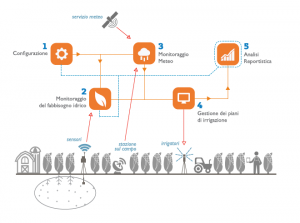 In agriculture, irrigation is the most expensive activity, especially when using mobile irrigation systems, and is also crucial for the quality and the health of the crops.
In agriculture, irrigation is the most expensive activity, especially when using mobile irrigation systems, and is also crucial for the quality and the health of the crops.
Current irrigation units usually mechanically apply pre-set watering plans at the beginning of the season based on weather time series. Only the most advanced ones, in relation to sensor data and/or weather forecasts, are able to block or anticipate one of the established irrigation rounds.
We work with the “preventive planning”method: plans do not have to be entered manually, but we generate them and update them automatically, taking into account at all times the condition of the crop, sensor data and weather forecasts.
This is possible because SWAP – Smart WAtering Planner is based on a set of technologies such as Business Intelligence, Artificial Intelligence, Big Data Management, sensing sensors and mechanical actuators, it is enriched by “ontological knowledge” and constantly consults short-term (5-day) weather forecasts.
Knowledge of the type of crop and its phenological phases, the constant detection of soil water balance, the “extreme” geolocation of the soil that allows to obtain personalized weather forecasts, are elements that integrate that knowledge base that allows SWAP to understand the current situation, predict the best future conditions and put into practice the solutions to obtain the best long-term result.
The adaptive features of SWAP are multiple:
- the current climate change does not allow us to plan irrigation shifts for the entire life of the crop. SWAP, without user intervention, adapts the distribution of irrigation to the real conditions, forestalling those phenomena that are not predictable at three months but that become predictable at 5 days;
- the correct management of irrigation requires knowledge of information that the user often does not have, first of all the soil composition. SWAP also allows you to enter “I don’t know”. In this case SWAP starts from default settings and then determines the “hydric behavior” of the soil within a few days, always keeping the crop safe;
- the 5-day plans are automatically recalculated each time sensor data diverges from the weather forecast. However, if these recalculations are too frequent, the SWAP machine learning engine identifies the cause and intervenes automatically (e. g. changing the value of a rule) or sends an alert (e. g. the weather source chosen by the user is not very reliable).
